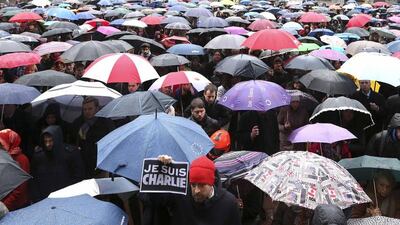The motivation and magnitude of the attack on the satirical magazine Charlie Hebdo will only add to France’s struggle to accommodate its Muslim population and the legacy of a dark colonial era.
As wave upon wave of demonstrators gathered in French cities, and elsewhere, to express dignified solidarity with the principle of freedom of expression, and with the slain of Wednesday, banners read “Nous sommes tous Charlie” (We’re all Charlie) or, in English, “Not Afraid”.
The commitment to free speech, illustrated by the first slogan, is not in doubt. But it is fanciful to suggest people are not apprehensive.
Talk on Parisian lips, portraying the atrocity as France’s 9/11, may be wildly exaggerated, given the hugely differing scale of human loss and devastation. But whether or not a link is found between the attack and a further shooting yesterday, leaving a policewoman dead in a southern Parisian suburb, a sense of genuine concern has entered the public consciousness.
Perhaps as disturbing is the sense of loathing such acts of merciless savagery also inspire, with innocents liable to be caught up in an outburst of collective hatred.
Many French people, Muslims as well as non-Muslims, work extraordinarily hard to encourage different cultures to coexist in harmony.
But the country is creaking under the weight of rising extremism, from Marine Le Pen’s crudely anti-immigration far right to a dangerous minority of extremists intent on committing their own atrocities in the heart of liberal Europe.
Moderate Muslim leaders readily volunteer condemnation after such acts as the Charlie Hebdo killings or the 2012 murders of seven people, three Jewish children among them, by a self-styled Al Qaeda jihadist in the southern cities of Toulouse and Montauban. The vast majority of Muslims, whether born and educated in France or arrivals from the former French territories of north and Sub-Saharan Africa, share their outrage.
Yet in the toxic atmosphere of the dispiriting banlieues, or outer-city suburbs, decades of poverty and discrimination have engendered a spirit of defiance among the young. It may be a giant’s step from the nationwide riots of 2005 to cold-blooded slaughter in magazine offices, or at the gates of a Jewish school, but the same rejection of core French values, and principles of integration and mutual tolerance, is in play.
Those who make the leap tend to range from dim-witted petty criminals, radicalised in jail or by rogue preachers, to well-educated fanatics. Both groups shun a society in which they do not, or will not, fit. ISIL and other militant groups have exploited this disenchantment, attracting around 1,000 French recruits, though this number includes converts. Many find it easy to return to France, where their presence may pose an immediate security threat.
At least one of the two French-Algerian brothers named by police after the Charlie Hebdo shootings had a record of involvement in sending volunteers to the battlefields of Syria and Iraq.
The man accused of killing four people in a machine-gun attack on the Jewish museum in Brussels last May, also French-Algerian, had recently returned from combat. The pattern is familiar; the Toulouse serial killer, Mohamed Merah, of similar roots, reportedly underwent Al Qaeda training in Pakistan and Afghanistan.
But there is another side to the sorry story of France’s failure to assimilate a Muslim population unofficially estimated at between five and seven million.
Close acquaintance with the French can shake any notion of universal adherence to the lofty national motto, “liberté, égalité, fraternité”.
It is no longer uncommon to hear openly racist views. This is especially noticeable in southern towns and cities where large-scale immigration from the Maghreb has produced at least the impression of population imbalance, in turn boosting support for Ms Le Pen’s Front National.
But her electoral clout, likely to strengthen further after this week’s events, extends to other parts of the country where immigrants have made their homes.
Even among the older generation of Maghrebin settlers, there is lingering resentment of the way France treated Algerians during and after the war of independence half a century ago. More recently, France’s ban on face-covering headwear was seen as a direct affront to one section of the population.
Charlie Hebdo, it was announced yesterday, will appear next Wednesday despite the crushing impact on its staff, the editor and main cartoonists murdered. That news may ease the pain, but only symbolically.
It is difficult to envisage a path forward that does not involve further turmoil, deepening inter-communal distrust and the potential for more bloodshed.
But the fate of one the 12 who died at Charlie Hebdo shows that the suffering has crossed the cultural divide. Ahmed Merabet was a Muslim. He was also the policeman whose last moments were captured on film, one of the gunmen shooting him in the head, falsely in the name of Islam, as he lay wounded, pleading for life.
One message left at the scene read: “Ahmed Merabet died protecting the innocent from hate. I salute him.”
If those words could be embraced by the millions of French people who happen also to be Muslim but deplore extremism, and if non-Muslims can rise above religious distinction, there may be just a glimmer of hope. If not, France’s future is a bleak one.
foreign.desk@thenational.ae


